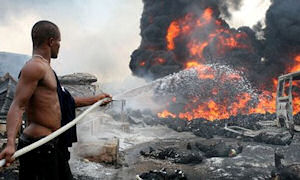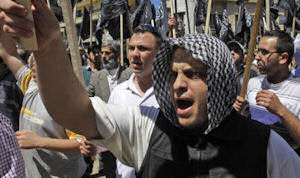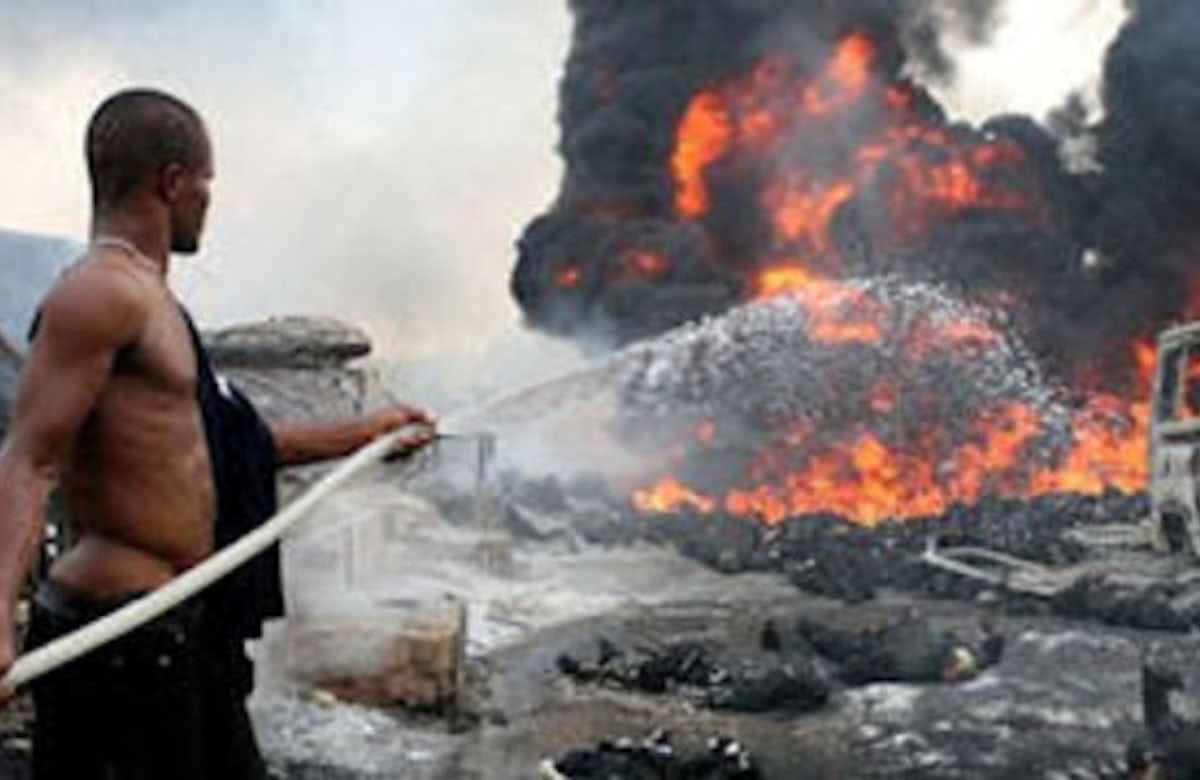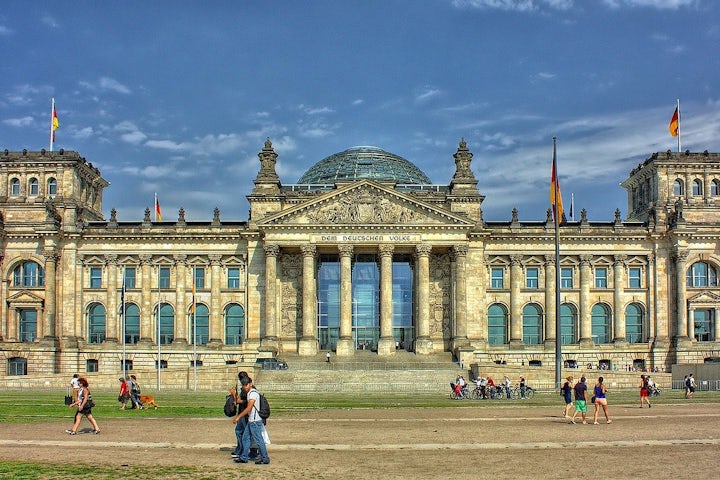 The skyline in the rebelling Syrian city of Homs is dominated by a large suffocating black cloud – the result of a major explosion in the gasoline pipeline held by the rebels. The Syrian government and the rebels are pointing the finger at one another. However, the rebels’ claims that the government is responsible for the blast are quite plausible. Syria’s state-controlled TV was quick to broadcast the gruesome event, showing a supposed government interest in the blast. Analysts have suggested the blast could serve as a pretext for the army to re-capture the city, as the explosion is deemed as a terrorist act. The rebels, however, have no interest in severing a pipeline that serves as their lifeline to withstand the army and its siege on the city.
The skyline in the rebelling Syrian city of Homs is dominated by a large suffocating black cloud – the result of a major explosion in the gasoline pipeline held by the rebels. The Syrian government and the rebels are pointing the finger at one another. However, the rebels’ claims that the government is responsible for the blast are quite plausible. Syria’s state-controlled TV was quick to broadcast the gruesome event, showing a supposed government interest in the blast. Analysts have suggested the blast could serve as a pretext for the army to re-capture the city, as the explosion is deemed as a terrorist act. The rebels, however, have no interest in severing a pipeline that serves as their lifeline to withstand the army and its siege on the city.
While there is but scant information coming out of Syria, it is safe to assume that the blast indicates that President Assad’s government considers Homs to be an enemy territory that should be treated as such. Accordingly, the Alawite-controlled army is carefully excluding Alawite neighborhoods in Homs and Hama from bombardment.
The rebels not only present a challenge to the personal rule of Assad’s Alawite clan, but also to the pan-Arab ideology of the only ruling Baath party. The Baath ideology, which has dominated Syrian political life since the 1960s, was the cement with which the regime in Damascus united the fractured nation composed of a variety of religions, sects, tribes and regional loyalties. Absent the Baath conclusive ideology, Syria would resemble today’s Lebanon, former Yugoslavia or the Soviet Union without the all-embracing Communist ideology.
Due to the undying pressures to reform political life in Syria, the regime may be contemplating a strategy by which it will snatch as many territories and assets as possible for the Alawites and their Druze and Christian allies for the moment after the Baath hegemony crumbles, instead of considering actual political reform. In this hypothetical carving of the political landscape in Syria, the Sunni middle class in Damascus may well prefer to remain loyal to the Alawites rather than to the pro-Turkish Muslim Brotherhood. This might be the main reason why a 'Tahrir Square' scenario has not emerged in Damascus to serve as the ground zero of the Syrian rebellion.
A sectarian split in Syria would be of great concern to its neighbor, Turkey, because Syria’s Kurdish population will see it as a golden opportunity to dominate in their own territory along the border, where their fellow Kurds are also contemplating separation from Turkey. Turkey has barely managed its relations with the Kurdish autonomous region in Iraq and now may face an even more serious challenge in Syria.
 To compound the situation further, a similar problem may arise with the large Alawite minority in Turkey proper, which dwells along the shores north of the Alawite territory in Syria. A separate Alawite political entity in Syria may well aspire to unite with the Alawites in Turkey, in line with similar nationalist Kurdish aspirations. Another real temptation for Alawite separatism lies in the prospect of discovering natural gas and oil offshore the Alawite regions, which angry Alawites would not wish to share with the Sunni rebels.
To compound the situation further, a similar problem may arise with the large Alawite minority in Turkey proper, which dwells along the shores north of the Alawite territory in Syria. A separate Alawite political entity in Syria may well aspire to unite with the Alawites in Turkey, in line with similar nationalist Kurdish aspirations. Another real temptation for Alawite separatism lies in the prospect of discovering natural gas and oil offshore the Alawite regions, which angry Alawites would not wish to share with the Sunni rebels.
Syria’s internal schisms shed a light on Russia’s policy vis-à-vis its Levantine ally. Not only is Russia loyal to its Syrian client, but it also has a vested interest in preserving an Alawite canton, as its naval bases of Tartus and Ladhikiya lay along the Alawite shores. In addition, a strong Alawite entity that threatens Turkey satisfies another Russian interest of engaging Turkey in the Levant and keeping it away from the Balkans and the Caucasus.
Syria’s domestic issues also have a direct influence on its southern neighbor Israel. Earlier last week, the Syrian army conducted a drill to launch a SCUD missile under President Assad’s watchful eye. Israel, much like all of Syria’s neighbors, must regard the exercise as a threat and prepare for war the moment Assad feels exceedingly vulnerable. However, should the Alawites begin to think about splitting from mother Syria, they may perceive Israel as an asset that face a common threat: the spreading of the Muslim Brotherhood across the Middle East.






